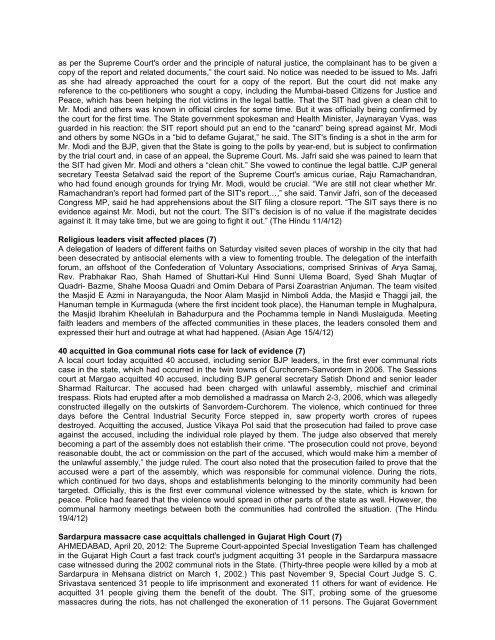Communal Riots-2012.pdf - Indian Social Institute
Communal Riots-2012.pdf - Indian Social Institute
Communal Riots-2012.pdf - Indian Social Institute
Create successful ePaper yourself
Turn your PDF publications into a flip-book with our unique Google optimized e-Paper software.
as per the Supreme Court's order and the principle of natural justice, the complainant has to be given acopy of the report and related documents,” the court said. No notice was needed to be issued to Ms. Jafrias she had already approached the court for a copy of the report. But the court did not make anyreference to the co-petitioners who sought a copy, including the Mumbai-based Citizens for Justice andPeace, which has been helping the riot victims in the legal battle. That the SIT had given a clean chit toMr. Modi and others was known in official circles for some time. But it was officially being confirmed bythe court for the first time. The State government spokesman and Health Minister, Jaynarayan Vyas, wasguarded in his reaction: the SIT report should put an end to the “canard” being spread against Mr. Modiand others by some NGOs in a “bid to defame Gujarat,” he said. The SIT's finding is a shot in the arm forMr. Modi and the BJP, given that the State is going to the polls by year-end, but is subject to confirmationby the trial court and, in case of an appeal, the Supreme Court. Ms. Jafri said she was pained to learn thatthe SIT had given Mr. Modi and others a “clean chit.” She vowed to continue the legal battle. CJP generalsecretary Teesta Setalvad said the report of the Supreme Court's amicus curiae, Raju Ramachandran,who had found enough grounds for trying Mr. Modi, would be crucial. “We are still not clear whether Mr.Ramachandran's report had formed part of the SIT's report…,” she said. Tanvir Jafri, son of the deceasedCongress MP, said he had apprehensions about the SIT filing a closure report. “The SIT says there is noevidence against Mr. Modi, but not the court. The SIT's decision is of no value if the magistrate decidesagainst it. It may take time, but we are going to fight it out.” (The Hindu 11/4/12)Religious leaders visit affected places (7)A delegation of leaders of different faiths on Saturday visited seven places of worship in the city that hadbeen desecrated by antisocial elements with a view to fomenting trouble. The delegation of the interfaithforum, an offshoot of the Confederation of Voluntary Associations, comprised Srinivas of Arya Samaj,Rev. Prabhakar Rao, Shah Hamed of Shuttari-Kul Hind Sunni Ulema Board, Syed Shah Muqtar ofQuadri- Bazme, Shahe Moosa Quadri and Omim Debara of Parsi Zoarastrian Anjuman. The team visitedthe Masjid E Azmi in Narayanguda, the Noor Alam Masjid in Nimboli Adda, the Masjid e Thaggi jail, theHanuman temple in Kurmaguda (where the first incident took place), the Hanuman temple in Mughalpura,the Masjid Ibrahim Kheelulah in Bahadurpura and the Pochamma temple in Nandi Muslaiguda. Meetingfaith leaders and members of the affected communities in these places, the leaders consoled them andexpressed their hurt and outrage at what had happened. (Asian Age 15/4/12)40 acquitted in Goa communal riots case for lack of evidence (7)A local court today acquitted 40 accused, including senior BJP leaders, in the first ever communal riotscase in the state, which had occurred in the twin towns of Curchorem-Sanvordem in 2006. The Sessionscourt at Margao acquitted 40 accused, including BJP general secretary Satish Dhond and senior leaderSharmad Raiturcar. The accused had been charged with unlawful assembly, mischief and criminaltrespass. <strong>Riots</strong> had erupted after a mob demolished a madrassa on March 2-3, 2006, which was allegedlyconstructed illegally on the outskirts of Sanvordem-Curchorem. The violence, which continued for threedays before the Central Industrial Security Force stepped in, saw property worth crores of rupeesdestroyed. Acquitting the accused, Justice Vikaya Pol said that the prosecution had failed to prove caseagainst the accused, including the individual role played by them. The judge also observed that merelybecoming a part of the assembly does not establish their crime. “The prosecution could not prove, beyondreasonable doubt, the act or commission on the part of the accused, which would make him a member ofthe unlawful assembly,” the judge ruled. The court also noted that the prosecution failed to prove that theaccused were a part of the assembly, which was responsible for communal violence. During the riots,which continued for two days, shops and establishments belonging to the minority community had beentargeted. Officially, this is the first ever communal violence witnessed by the state, which is known forpeace. Police had feared that the violence would spread in other parts of the state as well. However, thecommunal harmony meetings between both the communities had controlled the situation. (The Hindu19/4/12)Sardarpura massacre case acquittals challenged in Gujarat High Court (7)AHMEDABAD, April 20, 2012: The Supreme Court-appointed Special Investigation Team has challengedin the Gujarat High Court a fast track court's judgment acquitting 31 people in the Sardarpura massacrecase witnessed during the 2002 communal riots in the State. (Thirty-three people were killed by a mob atSardarpura in Mehsana district on March 1, 2002.) This past November 9, Special Court Judge S. C.Srivastava sentenced 31 people to life imprisonment and exonerated 11 others for want of evidence. Heacquitted 31 people giving them the benefit of the doubt. The SIT, probing some of the gruesomemassacres during the riots, has not challenged the exoneration of 11 persons. The Gujarat Government
















